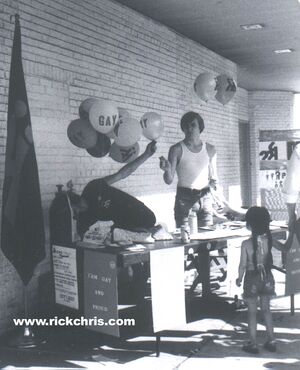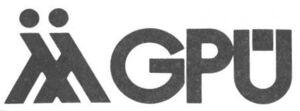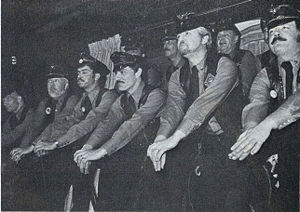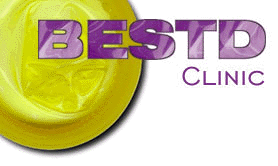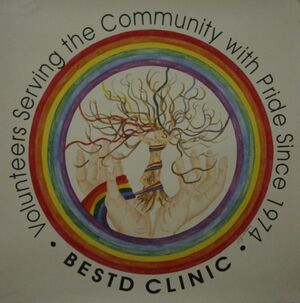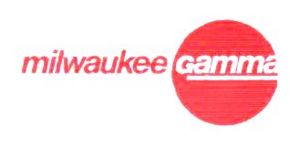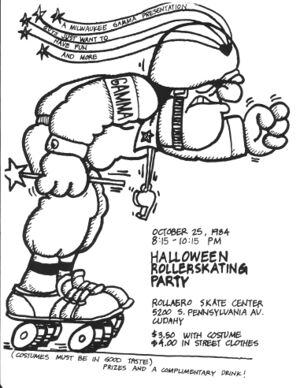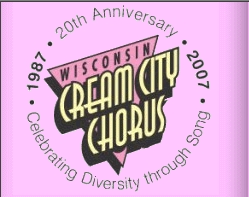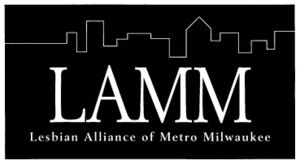Wis. LGBT History-- Organizations
ORGANIZATIONS in Wisconsin's LGBT History
Soon after the dust settled in Greenwich Village in 1969, gay civil rights organizations sprang up all over the country. Developments in Wisconsin were no different from what was happening elsewhere. In Milwaukee, both the Gay Liberation Organization and the Gay Liberation Front came into being in November 1970. The Gay Liberation Organization, fearing it would be confused with the more radical GLF, renamed itself the Gay People’s Union (GPU) in 1971.
Ever since, Wisconsin has had a wide range of organizations that enabled gays and lesbians to gather together to share common interests: in political action, health causes, sports, socializing, and other special interests.
The Wisconsin LGBT History Project website has just begun to document LGBT organizations, but aleady lists over 150 groups, many of which are documented by a web page and photos. The work continues.
A partial list of LGBT Organizations in Wisconsin from 1969 to 2010 is presented in a sidebar: WisLGBT Sidebar: Organizations in Wisconsin
A few of the groups that have helped shape Milwaukee and Wisconsin include:
Outreach
Madison (1969-present)
Outreach was formed in 1969 as the Madison Alliance for Homosexual Equality formed a speakers' bureau to raise awareness. It set up a phone line for people who had questions about their sexuality or who needed health information.
And so, amid the throng of burgeoning movements gearing up for the 1970s, the door was pried ajar in Madison, which was on its way to becoming one of the most open cities in the nation. The group was later renamed Outreach, and continues as one of Madison's most active LGBT organizations.
Gay Peoples Union
Milwaukee (1971-2000)
The Gay Peoples Union (or GPU) was founded as a social service agency dedicated to the needs of the gay community, and concurrently dedicated to educating the community at large about gays and lesbians.
The GPU was the "first" at many things: they opened the first gay/lesbian community center (the Farwell Community Center), the first gay health clinic (the GPU Venereal Disease Clinic, at one time offering testing 4 days a week- and which has since evolved into the BESTD Clinic and still operates 35 years later), a regular newsletter and membership-mailed magazine, hotline, and numereous other firsts.
The GPU was also the first organization in Milwaukee to host an event that had “Pride” appeal, with over 350 people attending the GPU Ball in 1974. Other dances and parties were hosted in the years that followed, and by 1981, a subgroup of the GPU, the Milwaukee Pride Week Committee, was coordinating activities of various organizations and also organized marches/ parades, rallies, and street festivals. Pride celebrations would eventually be organized by a more formal group, the Milw. Gay/Lesbian Pride Committee (MGLPC), and eventually PrideFest.
The GPU largely went into decline after about 1985. Its magazine, the GPU News, for 10 years the best source of local gay/ lesbian news, was folded after the January 1981 issue after not enough volunteers were available to create it. During the 1990's and into the 2000's, the organization existed basically in name only.
Fox Valley Gay Alliance
Appleton/ Neenah (1972-1975)
In November, 1972, during a dinner party at a home in Neenah, discussions ensued regarding the possibility of forming a gay and lesbian group or organization for the Oshkosh-to-Appleton area. There were six men at that dinner party who agreed to speak with their gay and lesbian friends about this subject. A week later, an organizational group of twenty gays and lesbians met at the Conway Hotel bar in Appleton.
Meetings were held every other Tuesday during 1973. Gays and lesbians attended from as far away as Fond du Lac, Green Bay, Manitowoc and Wausau. Most meetings had forty to fifty people in attendance and were held in members’ homes.
The first official FVGA event was a Mardi Gras party held at a member’s home in Neenah with fifty-two people in costume. Other events/parties included a FVGA picnic in Menominee Park, Oshkosh, a Halloween party, and a Christmas gathering during 1973.
During the following year, 1974, the primary discussion topic at most FVGA meetings was the search for a gay/lesbian-friendly bar in the Fox Valley area. The Conway Hotel bar and Cleo’s Brown Beam in Appleton and Mr. Luckys in Oshkosh were notorious as gay hangouts. Several attempts to make these, and a few other bars, openly “gay-friendly” were not successful.
In October of 1974, after a FVGA meeting in downtown Appleton, a group of members walked into Doris’ Super Bar on College Avenue. Following a few discussions with owner, Doris, she was willing to give it a try. Doris’ became a very profitable gay/lesbian bar, and was subsequently sold to a gay couple and renamed the Lambda Lounge. Many FVGA meetings and parties were held at this establishment.
FVGA meetings became less frequent in 1975. The main objective of the group had been met. The last FVGA gathering was a Mardi Gras held at the Lambda Lounge on February 29, 1975.
Silver Star Motorcycle Club
Milwaukee (1973-1980)
The Silver Stars Motorcycle/ Leather Club was formed in June 1973 as a motorcycle club, and was largely associated with the Wreck Room bar.
In September 1975 a subsidiary of the Silver Star M.C. Inc. published "G Milwaukee", a publication addressing the need for people "wanting a local paper or magazine to get the news of social events, activities and local news out to the gay community", and welcoming "anything of interest... to the gay community". The first issue addressed venereal diseases; offered a guide on "How to 'Make It' with a Leather Man"; promoted a Childrens Christmas Drive; printed a letter from a newer member of Silver Stars M.C.-- and had a "guide" listing 12 bars and two bathhouses.
In the late 1970s a faction formed within the group, and in 1981 some of the members split off to form a rival motorcycle club, Castaways M.C.. Soon, the Silver Star group refused to allow dual memberships: that is, a member of Castways would not be allowed to also be a member in Silver Star.
Silver Star folded as an organization by the early 1980s.
Brady East STD/ BESTD Clinic
Milwaukee (1974-present)
The BESTD story is a long history of volunteers providing healthcare services to greater Milwaukee. In the early 1970's, a group of concerned and caring people responded to the rising incidences of sexually transmitted diseases in Milwaukee and the lack of sensitive, accessible resources. Their discussions and encouragement from the Milwaukee Health Department and the Wisconsin Division of Health resulted in the founding of the BESTD Clinic (then known as the Gay People's Union Venereal Disease Clinic - GPU VD Clinic) in October 1974.
Located initially in rented quarters on east St. Paul Avenue, and then on Farwell Avenue, the Brady East STD Clinic, Inc., moved to its present facility on Brady Street in 1981. In 1990, Dr. Roger Gremminger, a physician volunteer, board member and building owner, gifted his property equity to BESTD. Off-street parking adjacent to the Clinic was made available in 1996 with the cooperation of a friendly neighboring business.
While traditionally focusing on the diagnosis, testing and treatment of sexually transmitted diseases, BESTD, because of its entirely volunteer staff, has been flexible and swift to respond to new challenges. In 1983 through 1984, some of the BESTD volunteers began preliminary responses to what we now know as a growing epidemic. They formed the Milwaukee AIDS Project as a committee of BESTD Clinic (which was later spun off to be the AIDS Resource Center of Wisconsin).
With the mission of providing unmet or underprovided services, BESTD Clinic became one of the early pioneers in HIV antibody testing. Today, it is one of the most active and accessible anonymous testing sites in the State of Wisconsin. Clinic volunteers also initiated "outreach clinics" for off-site testing. One of the early outreach clinics was done in concert with the Milwaukee Health Department and offered counseling and testing for those at risk to both HIV infection and tuberculosis. The tests performed at BESTD and its outreach sites identify and large number of newly diagnosed persons who are HIV infected.
Wisconsin Womyn's Land Co-Op
Madison area (1976-c1984)
In the fall of 1976, 40 or so women from Madison and Milwaukee began meeting with the idea of buying land collectively for use by 'womyn and children'. At the first official meeting they went around a circle and shared fantasies about womyn's land. This meeting led to the eventual purchase of a piece of land of about 80 acres, 2 hours north of Madison, called DOE farm (DOE standing for Daughters Of Earth). The mortgage and the continuing cost of maintaining the farm was to be paid by a collective living on the land, as well as additional donations.
The Wisconsin Womyn's Land Co-op's members seemed to primarily identify by gender (as women, seeking to underscore the difference of gender identity), but its also clear that most of the members were lesbian, so sexual orientation clearly was important to them, as well.
The Co-op appears to have had as many as 200 members over time. However by the mid 1980s the group seems to have disbanded. The disposition of the land is unknown.
Saturday Softball League / SSBL - (Milwaukee, 1977-present)
The Saturday Softball League, or SSBL, was created in 1977. SSBL's main activity is to provide a softball league which runs on a weekly basis during the late spring and summer time. The purpose of the league is to allow gay, lesbian, and bisexual players to gain experience and develop softball skills within a formalized structure. The league membership includes both men and women, heterosexuals and homosexuals, young and old. The league play is governed by rules set forth by the American Softball Association and the league body. The playing rules and format are almost identical to other leagues throughout the Milwaukee area.
Besides regular play, the league offers skills clinics. At these clinics, players are coached in the various aspects of softball play including hitting, fielding, running, and throwing. These clinics are run by league members and former league members with superior skills and vast experience in playing softball.
The purpose of the seasonal league play and clinics are to develop the gay, lesbian, and bisexual players skills to a level which allows them to compete comfortably within the larger leagues that currently exist for the majority heterosexual population. While increasing the players physical skills, the league also increases the players self confidence and esteem through recognition. At the end of each season an awards ceremony is held to recognize the achievements by various members and teams.
SSBL also holds a yearly tournament which is open to any gay, lesbian, and bisexual team. The tournament (originally called the Wreck Room Classic, and then The Milwaukee Classic) is international, usually consisting of 16-25 teams. The tournament allows gay, lesbian, and bisexual players from around the world to play in a more competitive format. The format is very similar to softball tournaments which are frequently available to the majority heterosexual population. [1]
GAMMA - (Milwaukee, 1978-present)
GAMMA started as a sports group playing touch football along the lakeshore in the summer of 1978. They had a celebratory dinner that fall, and the following year also took up social and competitive volleyball inside a gym at UWM. The group quickly become a combined social and sports organization, establishing traditions such as camping, biking and rafting trips; an early September Corn Roast; cruises on the Iroquois cruise boat; rollerskating; etc.
The genesis of the name has long been questioned. In its early years some members said it might have stood for "Gay Athletic Milwaukee Men's Association"-- but that has long been in contention, and is certainly not 'politically correct' when the organization continues to try to recruit women. However, despite the organization's best efforts, it has always been a battle to try to get women to join: while 2 or 4 lesbians might join one year, typically they would not remain members long, as the combination of lack of events focused toward women, and lack of other women also participating, worked against those recruitment efforts.
Some say the average age of a member has increased: older members seem to remain, but there is not a huge influx of younger members. And, the focus of events has shifted somewhat over the years, more towards social activities and fewer athletic ones. Even volleyball, an old mainstay during the group's first 20 years, is done less often now. Still, the group continues to sponsor both sports and social activities each month: during the warmer months, biking, camping and hiking are popular, while during the colder months snow skiing and other physical events are pursued.
The organization has remained remarkably healthy and vibrant as it approaches 32 years old. The number of activities continues to be healthy, with the typical monthly activity calendar in 2009 and 2010 still showing 10-15 events a month.
Cream City Foundation/ CCF - (Milwaukee, 1982-present)
Cream City Foundation (CCF) is the only non-profit, grant making, community-based foundation serving the entire State of Wisconsin whose sole purpose is to support the changing needs of the gay, lesbian, bisexual and transgender communities. The Cream City Association Foundation, as it was originally known, was formed in mid-1982 as the charitable arm of the Cream City Business Association (CCBA). However, CCAF quickly adopted its own set of bylaws and registered with the State and Federal I.R.S. as a separate charitable foundation. In December 1986, CCAF changed its name to the Cream City Foundation.
Beginning in October 1987 the CCF sponsored a regular cable program called "Tri-Cable Tonight", which was sponsored by a group of people called Milwaukee Gay/Lesbian Cable Network and became a subcommittee of the CCF. This network of people created original lesbian/gay programming for almost 5 years for telecast on Warner cable open access channels.
In December 1987 the CCF opened an office and conference facility, which became the meeting place for many other organizations and events over the next 2 years. It was also the place that new mayor John Norquist met with gay/lesbian community leaders in May 1989 to discuss how his new administration could be more LGBT-issues aware, a first for a city mayor.
The Cream City Foundation continues to go strong in 2010.
Cream City Chorus - (Milwaukee, 1987-present)
Founded on April 1, 1987, The Wisconsin Cream City Chorus Ltd. is an organization with a rich history and a unique place in the Greater Milwaukee area. Although many are familiar with the Cream City Chorus name, few are aware of what makes the group truly unique.
First and foremost is their message of celebrating diversity in all its forms. Originally formed as a chorus of gays, lesbians and their friends, the chorus now strives to celebrate the rich diversity of our community at large- not just the LGBT community- through the performance of quality choral music. The chorus, which embraces all races and faiths, asserts that it is not enough to simply be diverse; the selection of music and message must also reflect that diversity.
They are a member-controlled chorus. Every member, singing or nonsinging, has a vote. This includes board elections, approval of Artistic Directors, and even a voice in how the group moves forward into the future. Many feel this is one of the reasons the WCCC broadened its mission to celebrate diversity in all its forms. It was simply an official recognition by the membership of the ideals the group had already been embracing.
The WCCC produces two to four concerts annually. They can include either a social event or a Bistro Show in October, a traditional Winter Concert in January; a “Signs” Concert in April which features artistic interpreters in the language of American Sign as guest performers; and The Cabaret Show in June which is comprised of solos and ensemble numbers, plus several full-chorus numbers. [2]
Lesbian Alliance of Metro Milwaukee / LAMM - (Milwaukee, 1989-present)
Working for lesbian rights and awareness since 1989, LAMM is a membership organization serving the political and social needs of the Milwaukee area lesbian community. LAMM and its "sister" organization, LAMM-Education Fund, provide dances, picnics, social events, educational panels and workshops, and co-sponsors lesbian health projects, potlucks and speakers, conferences and forums.
- Return to INTRO page: Wisconsin LGBT History Project- Intro
Explore the full web site documenting GLBT life in Milwaukee, Madison, Green Bay, and all of Wisconsin at: http://www.WisconsinGayHistory.org
References
Unless otherwise noted, all contents of this page copyrighted by Don Schwamb of the Wisconsin LGBT History Project.
